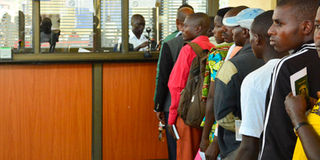Immigration officials debate possibility of free movement

An immigration official attends to people at Mutukula border. Business communities in regional economic communities have for long complained about the restrictive immigration processes that make it impossible and expensive for them to travel across the region. FILE PHOTO
What you need to know:
Kenya is the first country to deposit its instrument of Ratification of the COMESA-EAC-SADC Tripartite Free Trade Area, Dorothy Nakaweesi writes.
There is light at the end of the tunnel that will see free movement of business persons within the Tripartite Free Trade Area (TFTA) of the three regional economic communities.
TFTA is a proposed African free trade agreement between the Common Market for Eastern and Southern Africa (COMESA), Southern African Development Community (SADC) and East African Community (EAC).
The Tripartite Free Trade Area agreement has a huge market and investment opportunities for member states.
However, the business communities in these regional economic communities have for long complained about the restrictive immigration processes that make it impossible and expensive for them to travel across the region.
Some of these include extensive visa procedures, lack of uniformity of procedures and multiple physical checks. Visa fees and other taxes on business persons are varied between member states with some charging as high as $250 (Shs950,000).
In addition, there are high additional taxes that are not directly linked to Visas such as airport tax and some more taxes not linked to any administrative costs or service provided.
A solution to this is being handled by the chiefs of Immigration departments from the COMESA, EAC and SADC regions who met recently in Nairobi to discuss ways of introducing free movement of business persons within the Tripartite Free Trade Area.
Speaking to the immigration officers, the chairperson of the COMESA-EAC-SADC Tripartite Mr Sindiso Ngwenya described the restrictions as archaic and connected to colonialism.
He said these processes are also preventing Africa from embracing the digital age.
“It is a paradox that whereas under the free trade area, goods originating within the member/partner states that qualify under the Tripartite Rules of Origin can move freely. That is not the case with business people,” Ngwenya noted.
He said is no Union without the free movement of people including business persons.
This meeting was necessitated by failure of immigration technical officers to find consensus, after several rounds of negotiations, on a number of important issues about free movement of business persons, goods, services and investment across the tripartite region.
Meanwhile, Kenya is the first country to deposit its instrument of Ratification of the COMESA-EAC-SADC Tripartite Free Trade Area.
Kenya’s High Commissioner to Zambia and Malawi and also Permanent Representative to COMESA, Sophie Kombe, presented the instrument to the chair of the Tripartite Task Force, Mr Sindiso Ngwenya who is the Secretary General of COMESA.
Ms Kombe said: “This provides an expanded market for her manufactured goods, primary goods and services.”
The TFTA, which was launched in June 2015, brings together 27 countries under the three regional economic communities.
It requires a minimum of 14 countries to sign and ratify to enter into force.
So far, 22 countries have signed the TFTA with only five outstanding.
Kenya is among three countries that have done both: signed and ratified the TFTA alongside Egypt and Uganda.




